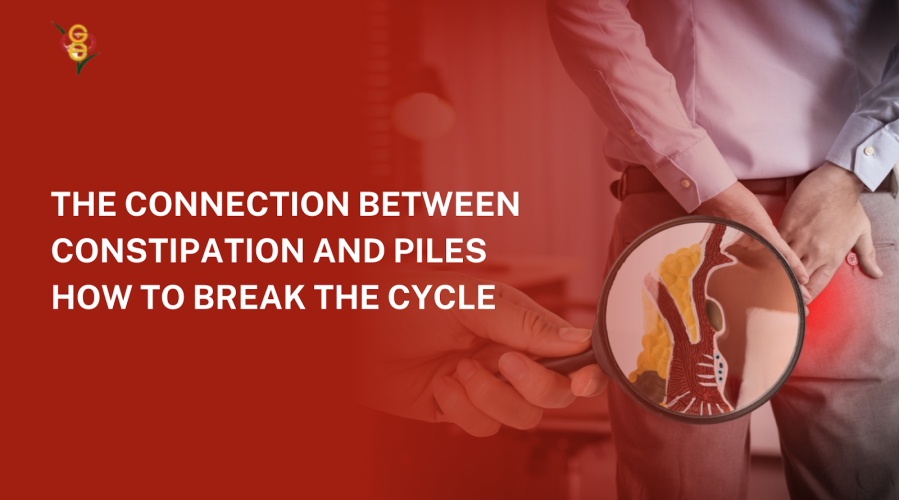Learn what gallstones are, their common symptoms, causes, and treatment options. Discover when to seek medical care and how to manage gallstone complications effectively.
The Connection Between Constipation and Piles: How to Break the Cycle

Both constipation and piles are two of the most prevalent health issues that are usually associated. It is also important to understand the relationship between these conditions to effectively address them and find relief. In this blog we will discuss how constipation results in piles, difficulties this causes and how to stop this cycle with right care and right piles treatment.
Understanding Constipation
It is a condition where an individual’s bowel movements reduce in frequency or become hard to pass. Some of the causes include inadequate fiber intake, lack of water intake, inactivity or even stress. When you exert too much force when you are defecating, this puts much pressure on the rectal and anal region. This is where the link to piles comes in handy.
What Are Piles?
Piles, also referred to as haemorrhoids, are inflamed blood vessels in the rectum or anus. They can lead to some complications such as pain, itch, bleeding and discomfort while defecating. Piles are broadly classified into two types:
- Internal Piles: Sited within the rectum they are not necessarily painful, but they can cause bleeding.
- External Piles: They are located subcutaneously around the anal region and are usually tender and may cause a lot of pain.
The leading cause of piles is constipation. Now let’s see how the two are linked.
The Link Between Constipation and Piles
If you are constipated, you will find yourself pushing or straining in order to pass stool. This straining puts pressure on the veins in the rectum and makes them dilate and become piles. If constipation is a regular affair, the condition gradually becomes severe and turns into chronic piles, often requiring piles treatment. Also, hard stools may cause itching around the anus, which worsens signs such as pain and bleeding.
This cycle of constipation, piles, and piles resulting in worsening of constipation due to fear of pain is rather difficult. But the good news is that it is not impossible to change all these habits and enhance your general health.
How to Break the Cycle
The cycle of constipation and piles can only be ended by following some preventive measures and some medical treatments as well. Here are some steps to consider:
1. Increase Fibre Intake
A Fiber rich diet is recommended in the management of constipation and hard stools. You should increase your intake of whole grain foods, fruits, vegetables, and legumes. Fibre gets bulky, and therefore, it is not hard to pass without necessarily having to strain.
2. Stay Hydrated
Having enough water in the body helps avoid constipation hence the need to take a lot of water. This will ensure that your digestive system is working properly by drinking at least 8-10 glasses of water in a single day.
3. Exercise Regularly
The muscles that are in the intestines are worked through physical activity thus making food pass through the digestive system efficiently. Such exercises as walking, yoga, swimming should be especially effective.
4. Avoid Straining
Do not put much pressure on your bowel movements, as this is likely to worsen piles. If you struggle with constipation, try using a stool softener or talk to the doctor for further directions.
5. Seek Professional Help
If your piles symptoms do not disappear or improve with the above changes in your lifestyle, then you need to get professional piles treatment. You might be surprised to know that there are better health care facilities available in Coimbatore like GEM Hospital which provide you the best suitable treatment for you. The treatments may include medication or minor surgery, depending on the extent of your problem. For those seeking Piles treatment in Coimbatore, GEM Hospital offers advanced solutions tailored to your needs.
Effective Piles Treatment Options
Piles can be treated in many ways by today’s medical science, and the patient can be sure to get rid of the problem and lead a better life. Some common options include:
- Over-the-counter Creams and Ointments: These can give some sort of relief from pain as well as itching for some time.
- Non-surgical Procedures: Mild to moderate piles can be treated with rubber band ligation and sclerotherapy.
- Surgical Options: In the worst-case scenario, surgical interventions, such as haemorrhoidectomy or stapled haemorrhoidopexy, may be suggested.
GEM Hospital provides effective treatments and treatment plans of different diseases, offered by skillful doctors and other healthcare workers who pay much attention to the comfort of the patients.
Piles and constipation are interlinked but it is possible to free yourself from this problem cycle if you know how. Everyone can easily manage these conditions by changing his or her lifestyle, taking proper meals, and seeking professional treatment for piles when necessary.
Are you searching for expert care and more effective piles treatment? Then you can contact GEM Hospital today. Don’t wait for the pain to get worse; call us today and schedule your appointment.
Blogs & Article
Learn about bloating and gas problems, including common causes, symptoms, and effective solutions to improve digestion, reduce discomfort, and maintain gut health.
Learn how unverified Ayurveda treatments may cause liver damage, understand the risks, symptoms, and why medical guidance is essential for safe care.


